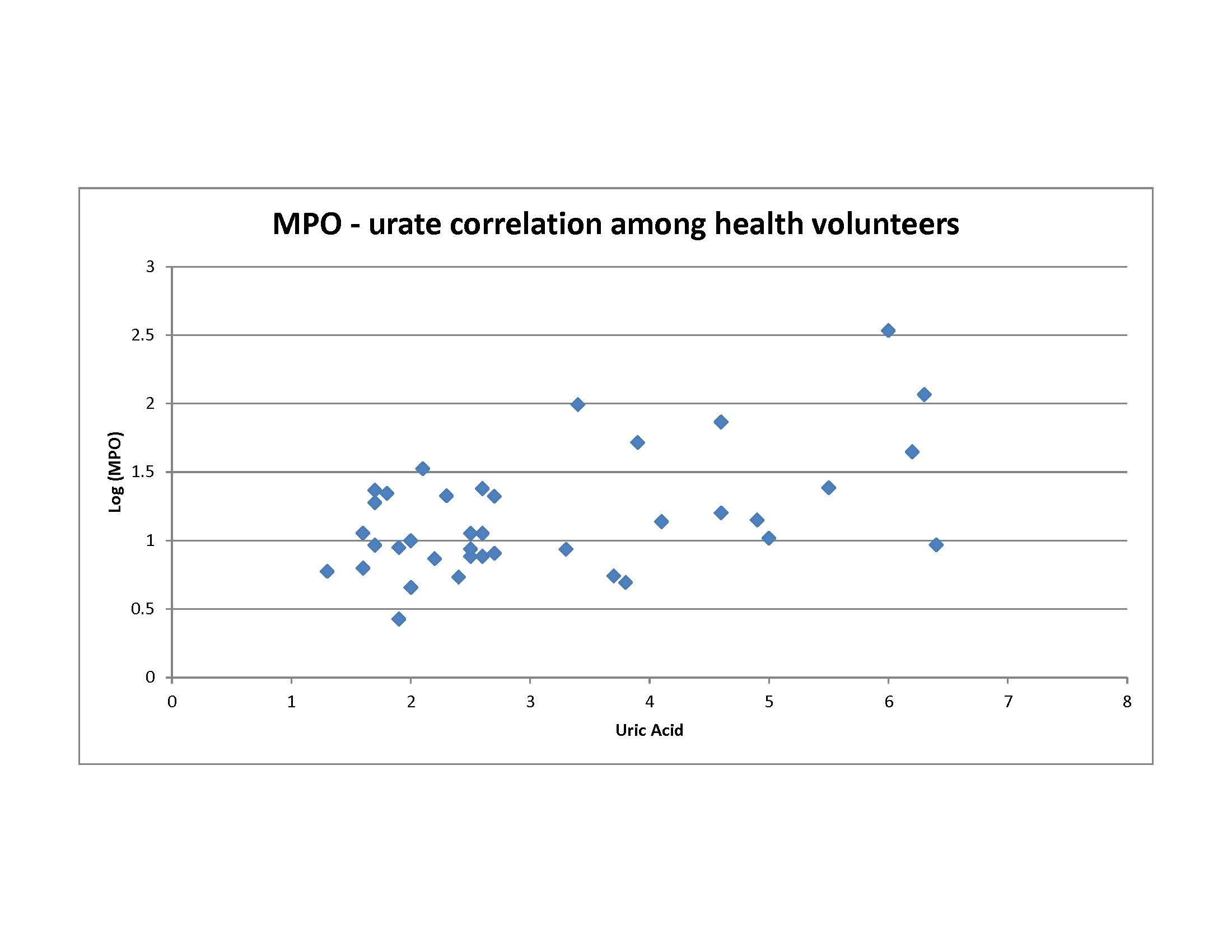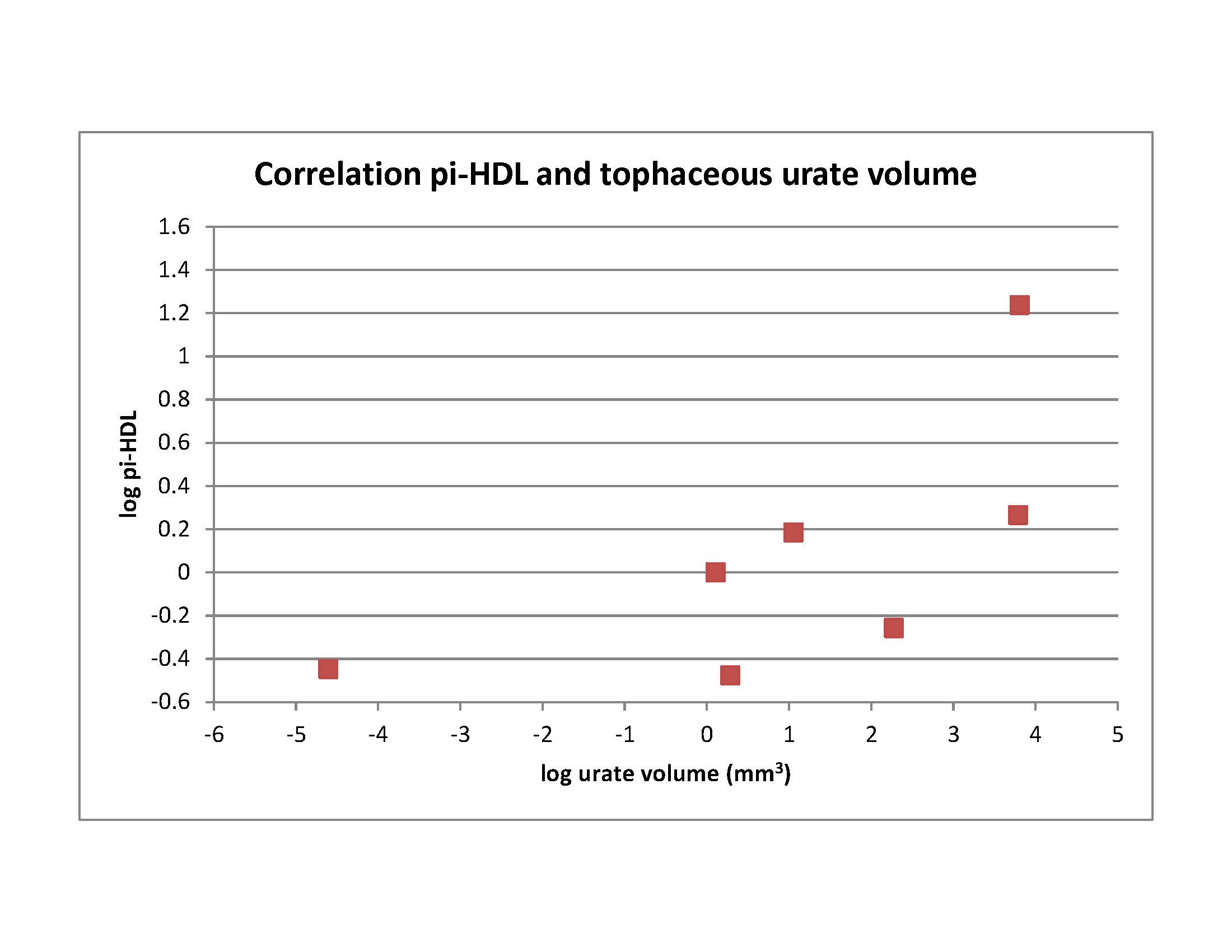Session Information
Date: Tuesday, November 15, 2016
Title: Metabolic and Crystal Arthropathies - Poster II: Epidemiology and Mechanisms of Disease
Session Type: ACR Poster Session C
Session Time: 9:00AM-11:00AM
Background/Purpose: Gout and hyperuricemia have been associated with cardiovascular disease. Studies have documented the impact of serum urate levels on hypertension and that increased urate levels lead to release of myeloperoxidase from neutrophils in gout patients. Our group has described that HDL can function as anti-inflammatory HDL (protective) or pro-inflammatory HDL (piHDL –which exacerbates progression of cardiovascular disease) in RA, SLE and SSc patients. We sought to evaluate association between hyperuricemia and tophaceous urate load on biomarkers of cardiovascular disease.
Methods: Using plasma from healthy normal controls (from established SLE – piHDL comparator group) we compared plasma urate with myeloperoxidase (MPO), piHDL, and traditional cardiovascular measures (BMI, Total Cholesterol, HDL, LDL). Pro-inflammatory HDL function was determined by measuring the change in fluorescence intensity caused by oxidation of DCFH by oxidized LDL in the presence or absence of test HDL. Fluorescence intensity in the absence of HDL was normalized to 1.0. Values greater than 1.0 after the addition of HDL indicated piHDL. MPO levels were measured using ELISA (R&D Biosystems). In this pilot study, we also investigated the relationship between urate burden and pro-inflammatory biomarkers by estimating total body urate burden in 7 patients. Urate volume was summed across all 4 extremities using dual energy CT. Pro-inflammatory HDL was measured as described above. (At time of abstract submission, MPO not evaluated.)
Results: Among the sample of normal controls, plasma urate was correlated with MPO (r=0.51, p< 0.001). Urate levels were not correlated with piHDL, age, ethnicity or BMI. Urate levels were correlated with total cholesterol (r= 0.30, p = 0.05) and LDL (r = 0.03, p < 0.05) but not HDL or TG. Among the pilot sample of gout patients, though small sample size, piHDL was well correlated with measured urate burden, r = 0.75, p = 0.05 (and r = 0.66, p = 0.10 for log transformed variables shown below). piHDL was not associated with urate, total cholesterol, HDL or LDL.
Conclusion: Increased plasma urate levels are associated with increased MPO levels in healthy normals but not piHDL. Increased urate deposits in gout patients are associated with increased piHDL activity. These findings may represent separate intermediary pathways between hyperuricemia and urate burden and cardiovascular disease.
To cite this abstract in AMA style:
FitzGerald J, Levine BD, Raymond J, McMahon MA. Impact of Plasma Urate and Tophaceous Burden on Inflammatory Biomarkers of Cardiovascular Disease [abstract]. Arthritis Rheumatol. 2016; 68 (suppl 10). https://acrabstracts.org/abstract/impact-of-plasma-urate-and-tophaceous-burden-on-inflammatory-biomarkers-of-cardiovascular-disease/. Accessed .« Back to 2016 ACR/ARHP Annual Meeting
ACR Meeting Abstracts - https://acrabstracts.org/abstract/impact-of-plasma-urate-and-tophaceous-burden-on-inflammatory-biomarkers-of-cardiovascular-disease/


